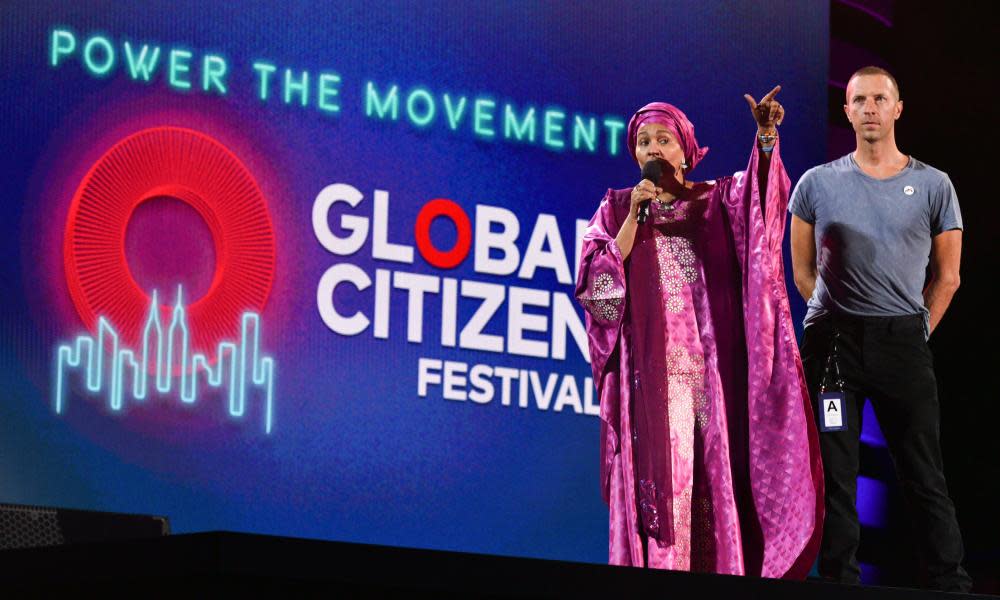‘Don’t muzzle them’: charities should be allowed to lobby for political change, tribunal finds

The charities regulator wrongly denied a leading anti-poverty organisation access to public benevolent status because its activities involved advocating for governments to do more to alleviate global suffering, a tribunal has ruled.
Global Citizen, a highly-successful international education and advocacy group headquartered in New York, is well known for successful campaigns on extreme poverty, polio, infectious disease and vaccination.
Last year it partnered with Lady Gaga to produce a globally televised concert, One World: Together at Home, which featured stars such as the Rolling Stones and Billie Eilish and messages from Matthew McConaughey and Lupita Nyong’o, as well as other figures including Michelle Obama and Oprah Winfrey.
The single event alone raised $129.7m for charities such as the World Health Organization’s Covid-19 solidarity response fund.
Related: Coalition accused of using charity crackdown to silence dissent
In Australia, however, the charities regulator has been fighting the organisation’s attempt to become a public benevolent institution (PBI), which would help it achieve deductible gift recipient status and open an avenue to receive grants from ancillary funds.
The ACNC has argued that Global Citizen could not be classified as a PBI because of its advocacy and attempts to influence government policy on poverty.
In 2019, the ACNC rejected the group’s application and has since fought an appeal in the administrative appeals tribunal.
Rather than providing aid relief directly, the ACNC argued, Global Citizen instead works to convince governments and philanthropists to do so. It said such “lobbying activities” precluded it from becoming a PBI.
On Friday, however, the AAT ruled in Global Citizen’s favour. It found the organisation was clearly organised to relieve poverty, by working to ensure “moneys are directed to international organisations that are involved in the direct delivery of aid and assistance in the relief of poverty”.
“We accept GCL can appropriately be described as an institution that is ‘organised’ for, or ‘conducted for’ or that ‘promotes’ the relief of poverty,” the AAT ruled.
The tribunal found that most large PBIs had to engage with the political process as a “regular and indispensable part of their work”.
Related: 24-hour Covid benefit concert announced with the Weeknd, Billie Eilish and more
“Once that reality is accepted, there is potentially a blurring of the distinction between a PBI that participates in the political process as part of its activities in providing benevolent relief and an entity that is pursuing political outcomes for their own sake,” it ruled.
“If the line needs to be more clearly defined, there may be a need for the parliament to refine the definition of ‘public benevolent institution’ in the legislation.”
The decision potentially paves the way for other groups like Global Citizen to apply for PBI status.
The federal opposition says the ACNC’s stance in the case is another example of it attempting to stifle political advocacy by not-for-profits and charities. Andrew Leigh, the shadow assistant charities minister, said the government had tried to “muzzle charities at every opportunity”.
“The Liberals want charities to be seen and not heard,” he said. “This decision rebuffs that narrow approach, and recognises that all Australians benefit when charities bring their expertise to public debates.”
The Global Citizen application was supported by World Vision and reverend Tim Costello , who said he believed “advocacy, awareness-raising and/or education of the type that Global Citizen undertakes does relieve poverty”.
Paul Ronalds, the chief executive of Save the Children, also spoke in support of Global Citizen’s application. He told the tribunal that advocacy to government was a crucial part of the work of NGOs.
“Direct relief activities such as food distribution or delivering education are a means of addressing one aspect of poverty; however, these activities alone are not sufficient to eliminate poverty or relieve poverty for all,” he said. “They need to be paired with meaningful changes in government policy and legislation at a national and international level.”
The ACNC said it was considering the decision.
“The ACNC welcomes decisions that assist with clarifying the law relating to eligibility for registration as a Public Benevolent Institution. We are currently considering the implications of the decision.”

 Yahoo News
Yahoo News 
